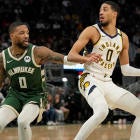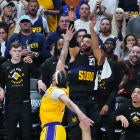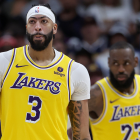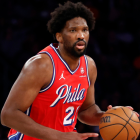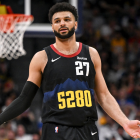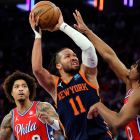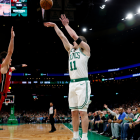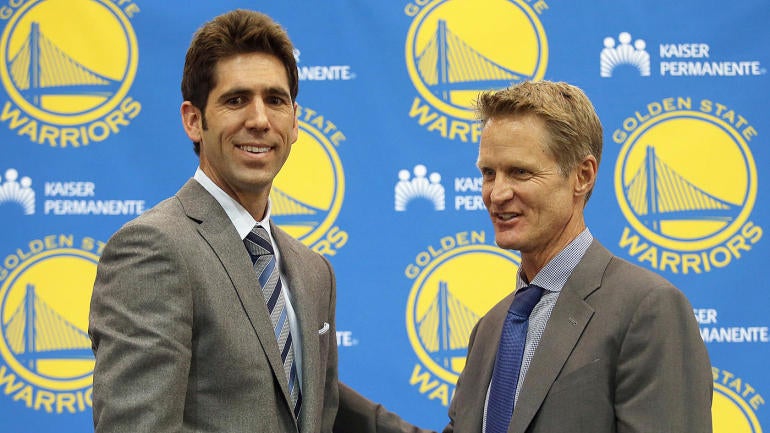
There was a point in NBA history in which contending teams somewhat routinely landed top draft picks. Four post-merger champions had, at some point in their building process, a top-two pick earned through some degree of luck: the 1979 and 1982 Lakers (Magic Johnson and James Worthy), the 1980 Celtics (traded for Kevin McHale and Robert Parish), the 1997 Spurs (Tim Duncan) and the 2003 Pistons (Darko Milicic). Milicic stands out like a sore thumb in that group, but generally, history has suggested that contenders adding top picks tend to win championships.
That's why the league works so hard to prevent it now. Teams have learned not to trade unprotected picks, and when they do, the Stepien Rule theoretically prevents them from trading too many of them. Lottery odds have flattened to such a degree that inadvertent tanks like San Antonio's in 1997 have very little chance of yielding a superstar. It has been 17 years since a true contender has picked this high in a draft, but through a combination of injuries and luck, the Warriors are here, and based on the success that those other teams have, it stands out as a modern rarity, a precious chance to rebuild a dynasty not afforded to most champions.
The problem is that there isn't a Magic Johnson or Tim Duncan sitting on the board for Golden State. That would make their decision easy, but with no consensus No. 2 pick and a ticking clock on their superstars, the Warriors are justifiably considering a trade. Boston's path in 1980 supports that approach. The Celtics didn't like Joe Barry Carroll, so they flipped him for two players that would become Hall of Famers.
It won't be quite that simple for Golden State. The rest of the NBA is just as wary of this draft class as the Warriors are. So let's break down the decision in front of the Warriors. Should they keep the No. 2 pick, or trade it?
Pro: It's Golden State's simplest path to a fourth star
Golden State followed a simple formula in 2016. Teams with four superstars tend to win championships. It added No. 4, Kevin Durant, through free agency. That was only possible, thanks to an unprecedented cap spike. Now, we're dealing with a possibly unprecedented cap crunch due to the pandemic. The Warriors already have Stephen Curry, Klay Thompson, Andrew Wiggins and Draymond Green on max contracts. They have no feasible path back to max cap space until, at best, the 2022 offseason. That would involve letting go of Curry. Realistically, they aren't re-entering the superstar free-agent market until 2023 at the earliest.
That leaves two possible ways of landing star No. 4: They can draft one or trade for one. As we've covered, if the Warriors felt like they could draft one, they'd do it. Most believe they can't in this class, and even if they do, it would take that player years to develop. Curry, Thompson and Green are in their 30s right now. They don't have years to wait. If the Warriors plan to add a fourth star for this current championship push, it almost has to be through a trade. The No. 2 pick could help them make that trade.
Con: A fourth star might not even be available
Usually, there are enough disgruntled stars for any big-market team with valuable assets to find one, but 2019's swap meet cleared the table. There are very few stars even in a position to change teams, and the few that make some sense don't appear to be available. The Wizards have shown no interest in trading Bradley Beal. Barring a Daryl Morey surprise, the 76ers aren't ready to break up Ben Simmons and Joel Embiid. The Bucks are riding the Giannis Antetokounmpo train to the end of the line. No player on the trade market remotely resembles a 28-year-old Durant.
They're all flawed in some meaningful way. Chris Paul is too old at 35. Victor Oladipo is too injury prone. Jrue Holiday is redundant with arguably the best backcourt in NBA history still intact. The Warriors want a star. The No. 2 pick can usually yield a star. In these specific circumstances, it probably can't.
Pro: A role player-based trade would still help the Warriors win now
Do the Warriors even need a fourth star? Probably not, unless you're of the belief that the aging Green no longer deserves that distinction. The Curry-Green-Thompson trio won a championship in 2015 without Durant and then won 73 games a year later. We haven't seen that core since. There's a reasonable chance we look back on the post-Durant concern regrettably as the Warriors pick up right where they left off in 2016.
But the 2016 Warriors had something the 2020 version doesn't: depth. Harrison Barnes, Andre Iguodala, Andrew Bogut and Shaun Livingston were essential cogs in that machine. The fifth-best Warrior right now is ... 2020 second-round pick Eric Paschall? Steve Kerr's coaching slogan is "Strength in Numbers." It lost all meaning with Durant, but his 2019 injury was proof of its importance. The Warriors were so depleted without him that they couldn't keep up with the Raptors in the Finals relying on minimum-salary backups.
We've covered a number of possible role player targets for the Warriors in the past. The truth is that almost any non-contending team would be interested in adding a No. 2 overall pick, even in a weak class. The options are almost limitless, and Golden State could target any sort of player it wanted.
Con: It could make the Warriors historically expensive
The package of Andrew Wiggins and the No. 2 pick is expensive in itself, but it has something going for it: cost-certainty. Wiggins has three years left on his deal. The No. 2 pick is locked up at a below-market rate for four. That isn't necessarily true of players the Warriors could acquire via trade.
Orlando is often mentioned as a target for this sort of deal, with Aaron Gordon and Evan Fournier being popular Warriors additions. This deal only works with Fournier opting into the final year of his contract, making him a 2021 free agent. Gordon expires in 2022. Both would need new contracts, and they'd have supreme leverage over the Warriors as they wouldn't have the cap space to replace them.
Golden State is already well beyond the projected luxury tax line. Through some combination of the NBA Draft, their Andre Iguodala trade exception, their mid-level exception and the trade market, the Warriors are going to add salary. At a certain point they have to draw the line financially, especially with the Chase Center likely closed next season.
Pro: It isn't even their best long-term asset
The Warriors have the No. 2 pick in a bad draft right now. It is entirely possible that they have the No. 4 pick in a very good draft a year from now. The D'Angelo Russell trade gave them Minnesota's top-three protected 2021 first-round pick. If it does not convey, it becomes unprotected in 2022. Now, no first-round pick is guaranteed to become a star. We've seen this with Boston's picks over the past two seasons. The Celtics expected very high picks out of the Kings and Grizzlies through trades. Instead, they got No. 14 in back-to-back drafts.
That being said, the Timberwolves play in a Western Conference with no obvious tankers (yet). They might have the NBA's worst defense next season, and generally speaking, a team picking No. 1 overall in one draft is somewhat unlikely to pick much lower in the next one. In all likelihood, the Warriors have another top draft pick coming. This class doesn't have a future star, but that one might.
Con: Keeping both picks extends their theoretical contention window
One top draft pick is nice, but not enough in the grand scheme of things. Even if the Warriors nailed the Minnesota pick, rebuilding a contender solely around that player as the remains of their dynasty decay around him would be extraordinarily difficult. Even into old age, Curry and Thompson are going to be expensive. They've given away their 2024 first-round pick already. There is a world in which the Warriors add one young stud and it ultimately doesn't amount to anything. That player may be too young to help the current core, who in turn would be too old to help him later.
But nailing two draft picks? That's the pathway to long-term contention even beyond the Curry era. Boston could survive that poor lottery luck because it already had Jaylen Brown and Jayson Tatum in the building. If the Warriors find two players like that, they'd never need to tank again, and they'd likely become a premiere free-agent destination the moment they cleared enough cap space to do so.
Pro: It could get them off Andrew Wiggins' contract
One of the biggest impediments to Golden State having any sort of cap flexibility in the near future is the money owed to Wiggins over the next three seasons. He is guaranteed around $95 million in that span. Considering his history on defense and as a shooter, there are very real questions about how much he adds to a contending team in the first place. He has, after all, played on only one playoff team, and that team's best player, Jimmy Butler, left in part because of that team's decision to pay Wiggins before him.
No team negotiating for the No. 2 overall pick would be particularly enthused about adding the Wiggins deal. Doing so may lock them out of serious cap space for three whole seasons. But if that's the cost of getting the No. 2 pick? They'd bite the bullet. It is yet another way Golden State can extract value out of this pick.
Con: Do they really want to get off Wiggins' contract?
The Wiggins deal is harmful to Golden State's bottom line more than anything else. He increases their tax bill, but with Curry, Thompson and Green in place, the Warriors were going to be above the cap regardless. In that sense, it's debatable just how toxic his contract really is to them. It isn't preventing them from pursuing other stars because that opportunity wasn't there. If anything, moving him now makes it harder to find matching salary in a possible future star trade.
The notion that Wiggins has a bad contract needs to be separated from the value he actually provides as a player. It's overly simplistic, but freak athletes that have averaged nearly 20 points per game in their career can usually help a good team in the right role. He is unquestionably the fourth-best Warrior right now. He has never played with anyone who can space the floor for him like Curry and Thompson. He's never been on a team good enough to warrant the defensive effort Golden State will demand out of him nightly.
The overarching point here is that Wiggins has a bad contract, but it's not necessarily a terrible one for the Warriors specifically. He was the No. 1 overall pick for a reason. He got paid for a reason. It's not as if his value is going to decline overnight. There's no real harm in seeing what he can do before deciding on his fate. This change of scenery might be exactly what he needs to turn his career around.
The verdict: It's complicated, but they should probably trade it
Ultimately, there is no blanket statement to be made here. If the Warriors get a better offer than we currently expect, they should probably trade the No. 2 pick. If they get worse offers than we currently expect, they probably shouldn't. This can be said about almost any trade decision.
If the offers are around what we expect them to be, it probably makes sense to trade the No. 2 pick for a simple reason: They need to do something. As it stands right now, it's hard to envision this iteration of the Warriors as championship favorites. It's possible, but unlikely based on depth alone. If Green's age continues to show as it did last season, or if Thompson isn't the same after a torn ACL, those concerns are magnified. But with their trio of veteran stars, the Warriors have a chance to win the championship next season. The Warriors once went 42 years between championships. These chances are meant to be seized while they exist. Golden State might not have another one for a long, long time no matter what its draft picks do.
As it stands right now, the Lakers are better than the Warriors. That isn't going to change through a decent rookie and a mid-level signing. Golden State has to take a gamble. Its two valuable first-round picks are the chips it can cash in. The Minnesota pick has too much possible long-term value to trade before knowing what it could be unless doing so would yield an immediate superstar. That makes the No. 2 pick the more prudent trade piece.
Again, this is ultimately going to come down to the offers. Trading for the sake of trading is rarely a good idea. But if the goal is to win the 2020-21 championship, there just doesn't appear to be a better way of doing that than using the No. 2 pick to improve their immediate fortunes. It worked for the Celtics in 1980. Even if they can't get Kevin McHale and Robert Parish, the No. 2 pick gives the Warriors access to players who can lift them back into the title chase.














